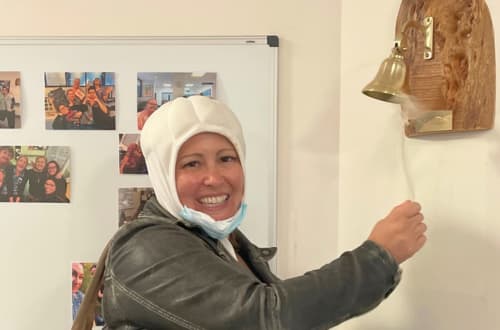Andrea was just 51 years old when she was diagnosed with stage 4 ovarian cancer.
“It was a huge shock. The day after my diagnosis I had to ring my doctor’s office so I could double check that the results were accurate, I was just that incredulous,” said Andrea.
Prior to her diagnosis, Andrea was undergoing emergency surgery for a hernia that was blocking her bowel. After the surgery, Andrea noticed a lump protruding from her stomach, which, three months later, had not improved.
To investigate further, Andrea was sent for a CA125 test — a blood test that looks for a protein that can be produced by ovarian cancer cells. The results showed elevated levels of the cancer-causing protein which encouraged her treatment team to investigate further. Following surgery and a biopsy of the lump, the doctor confirmed that Andrea had ovarian cancer.
“At the time I wasn’t aware of any symptoms I was experiencing. I now know, looking back, the indigestion and bloating I was facing were both early signs. I just never thought these minor symptoms meant that I could have stage 4 cancer. I knew nothing about ovarian cancer up until this point,” said Andrea.
After her diagnosis in November 2019, Andrea had to wait an excruciating two months before treatment.
“The wait really did my head in. I kept thinking about this thing growing inside me and I needed to get it out. Because my tumour was so big, my treatment team decided I needed to undergo chemotherapy before surgery to shrink the tumour,” said Andrea.
Andrea said despite knowing that she was awaiting treatment for stage 4 ovarian cancer, she tried to continue with her life as best she could.
“Initially, I kept going to work. My GP asked me ‘how are you doing it?’ and I told her that if I stayed at home I would have fallen in a heap. I didn’t have a choice. I just needed to keep putting one foot in front of the other so that I could stay upright,” Andrea said.
Following multiple rounds of chemotherapy, Andrea underwent a hysterectomy, including the removal of both her ovaries and some lymph nodes.
“Despite feeling really fatigued after surgery, I also immediately felt intense relief. I just thought, that’s it, the tumour is out, and I can get on with things. But that’s not always how things work out with ovarian cancer,” said Andrea
Following the surgery and while undergoing a second round of chemotherapy, Andrea began to experience an extreme pain in her shins. After some investigation, Andrea’s medical team told her the cause of her pain was blood clots, which needed further treatment.
Through a search on Google, Andrea came across Ovarian Cancer Australia, where she was put in touch with her own specialist ovarian cancer nurse, Rosetta.
“Rosetta is so knowledgeable and able to answer all and any questions I have, putting me at ease. It’s almost like she’s my sister.
“I don’t think I could do this without Rosetta. Friends and family can’t give you the kind of support she does. Rosetta is definitely made for this job,” said Andrea.
For Andrea, the thought of her three children, aged 15, 20 and 34, have motivated her to keep going.
“Having ovarian cancer is a series of setbacks. Every time you think you’re over the hill, there’s something else that happens.
“I can’t work anymore. I generally stick inside my four walls at home. The only time I go out is to see my father in aged care. I try every other weekend to catch up with my girlfriends, but fatigue often holds me back,” said Andrea.
Andrea said her message for people affected by ovarian cancer is to know that support is available.
“Despite what I’m going through, mentally I’m okay. I’ve actually surprised myself at how strong I’ve been, and Ovarian Cancer Australia have played a big role in that.
“There are resources out there to help you get through. Try and stay positive. Just get up in the morning and keep going,” said Andrea.




